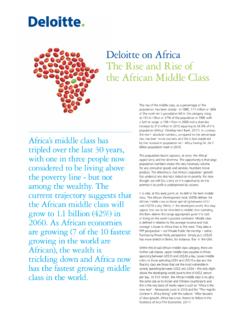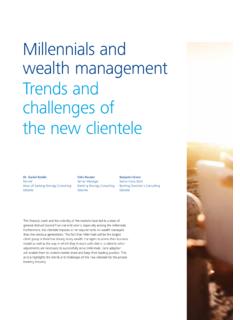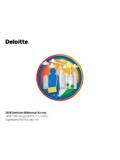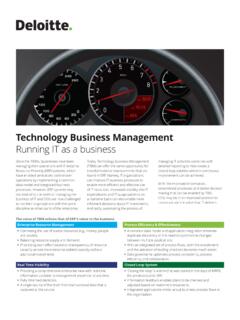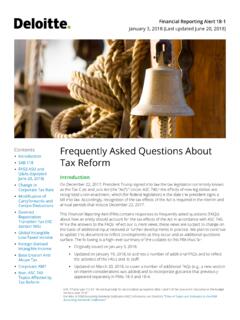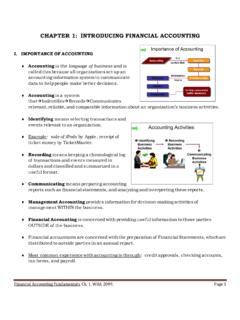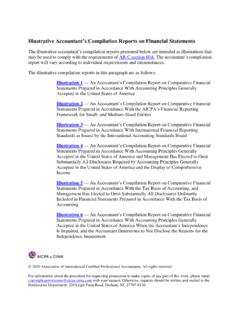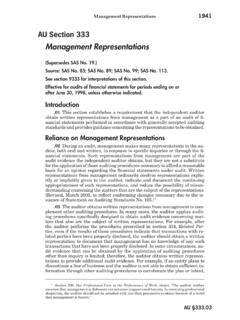Transcription of Tax Accounting Perspectives - Deloitte US
1 Tax Accounting Perspectives ASC 740 considerations as income tax returns are finalized September 28, 2018. Tax provision processes include analyzing the impact of changes for return-to-provision items that result when estimates used for the provision are different than amounts reported on income tax returns. Companies should record the tax Accounting impact in the period they identify the adjustments and may need to differentiate these from SAB. 118 adjustments. What's new? Potential tax expense (or benefit) for adjustments related to temporary What's new differences Potential tax expense (or benefit). The tax Accounting impact of return-to-provision ( RTP ) adjustments (also for adjustments related to known as return-to-accrual adjustments or true-ups) should be recorded in the temporary differences period identified.
2 Adjustments may be identified or finalized in the period income tax returns are filed assuming they are not known in an earlier reporting period. For calendar-year companies, returns are due in the fourth quarter and companies finalize RTP adjustments at that time. This timeframe coincides with Highlights the end of the up to one-year measurement period provided by SAB 118 that Analyzing return-to-provision requires final adjustments be recorded for the impact of tax reform. Therefore, adjustments many companies are evaluating both RTP and measurement period adjustments at the same time. After tax reform, adjustments for temporary differences that historically may not have impacted a company's overall tax expense may now impact a company's overall tax expense or benefit. For example, a calendar- What does this mean for you year corporation may have a RTP adjustment that increases or decreases current taxes at a 35% rate with the offset to deferred taxes at a 21% rate, Documenting change in estimate which would impact the overall tax expense.
3 Versus error conclusions Reporting a prior period error Recording adjustments as a Highlights discrete item in period identified Assessing impact of RTP. Analyzing return-to-provision adjustments adjustment on operating The RTP analysis compares estimated book and tax differences identified during effectiveness of controls the provision to differences computed based on income tax returns. Any resulting differences should be evaluated to determine whether variances are changes in estimates or a correction of an error (further guidance provided in ASC 250). Deloitte perspective Refer to Tax Accounting Perspective: SAB 118 considerations for proposed Think ahead Act now and regulations and interim reporting for further guidance on tax reform understand return-to-provision considerations. adjustments Tax Accounting Perspectives Reporting a prior period error important to determine the impact on tax Errors discovered after financial expense or benefit, whether errors are statements have been issued should be material or immaterial, adjustments to analyzed to determine whether the impact finalize provisional amounts and required is material.
4 Disclosures. Errors determined to be material may require restatement of previously issued financial statements, including additional filings, disclosures, and language in the Contacts audit report. Immaterial errors generally National Tax Accounting Group do not result in additional filings and are generally accounted for discretely in the Vickie Carr period identified. +1 214 840 1457. What does this mean for you Refer to Section of the 2017 Deloitte Companies will need to determine Roadmap to Accounting for Income Taxes whether adjustments are changes in for further guidance on distinguishing a Samantha Pietsch estimates or corrections of errors. It is change in estimate from a correction of an +1 213 996 4304. important to evaluate the change, report error. and record an adjustment appropriately, and determine whether it is an internal Recording adjustments as a discrete control deficiency.
5 Item in period identified Washington National Tax Group - Documenting change in estimate For interim reporting, a RTP adjustment is Accounting for Income Taxes versus error conclusions considered a discrete item recorded in the period identified (unless it constitutes a Patrice Mano Determining whether a change in a prior material error). While the RTP adjustment +1 415 783 6079. year tax provision resulted from a change in is not included in the calculation of the an Accounting estimate or an error is often Annual Effective Tax Rate ( AETR ), difficult and requires judgement. companies should evaluate the impact, if Changes in Accounting estimates result any, on current year estimates of similar when new information becomes available, a items included in the AETR. Pete O'Grady change in facts and circumstances arises, or +1 203 708 4587.
6 Information is identified that was not reasonably knowable or readily accessible as Assessing impact of an RTP adjustment of the prior reporting period. on operating effectiveness of controls Conversely, errors can result from Return-to-provision adjustments may mathematical mistakes, mistakes in the indicate tax controls are missing, not Paul Vitola application of generally accepted Accounting operating effectively or not being executed +1 602 234 5143. principles ( GAAP ), or oversight or misuse as designed. Companies may need to of facts that existed at the time the financial consider controls related to identified statements were prepared. errors to determine whether there is an issue with either the design or operating Entities should consider whether the effectiveness of controls over tax reporting. Chris Barton information was or should have been reasonably knowable or readily +1 703 885 6300.
7 Accessible from the entity's books and records in a prior reporting period and Deloitte perspective whether the application of information at that time would have resulted in different reporting. The determination of when Think ahead Act now to understand Alice Loo information was or should have been RTP and measurement period +1 415 783 6118. reasonably knowable or readily accessible adjustments will depend on a company's facts and Companies should evaluate both RTP and circumstances. measurement period adjustments as income tax returns are finalized and as the up to one-year measurement period ends. It is This document contains general information only and Deloitte is not, by means of this document, rendering Accounting , business, financial, investment, legal, tax, or other professional advice or services.
8 This document is not a substitute for such professional advice or services, nor should it be used as a basis for any decision or action that may affect your business. Before making any decision or taking any action that may affect your business, you should consult a qualified professional advisor. Deloitte shall not be responsible for any loss sustained by any person who relies on this document. As used in the document, Deloitte means Deloitte Tax LLP, a subsidiary of Deloitte LLP. Please see for a detailed description of our legal structure. Certain services may not be available to attest clients under the rules and regulations of public Accounting . Copyright 2018 Deloitte Development LLC. All rights reserved.
